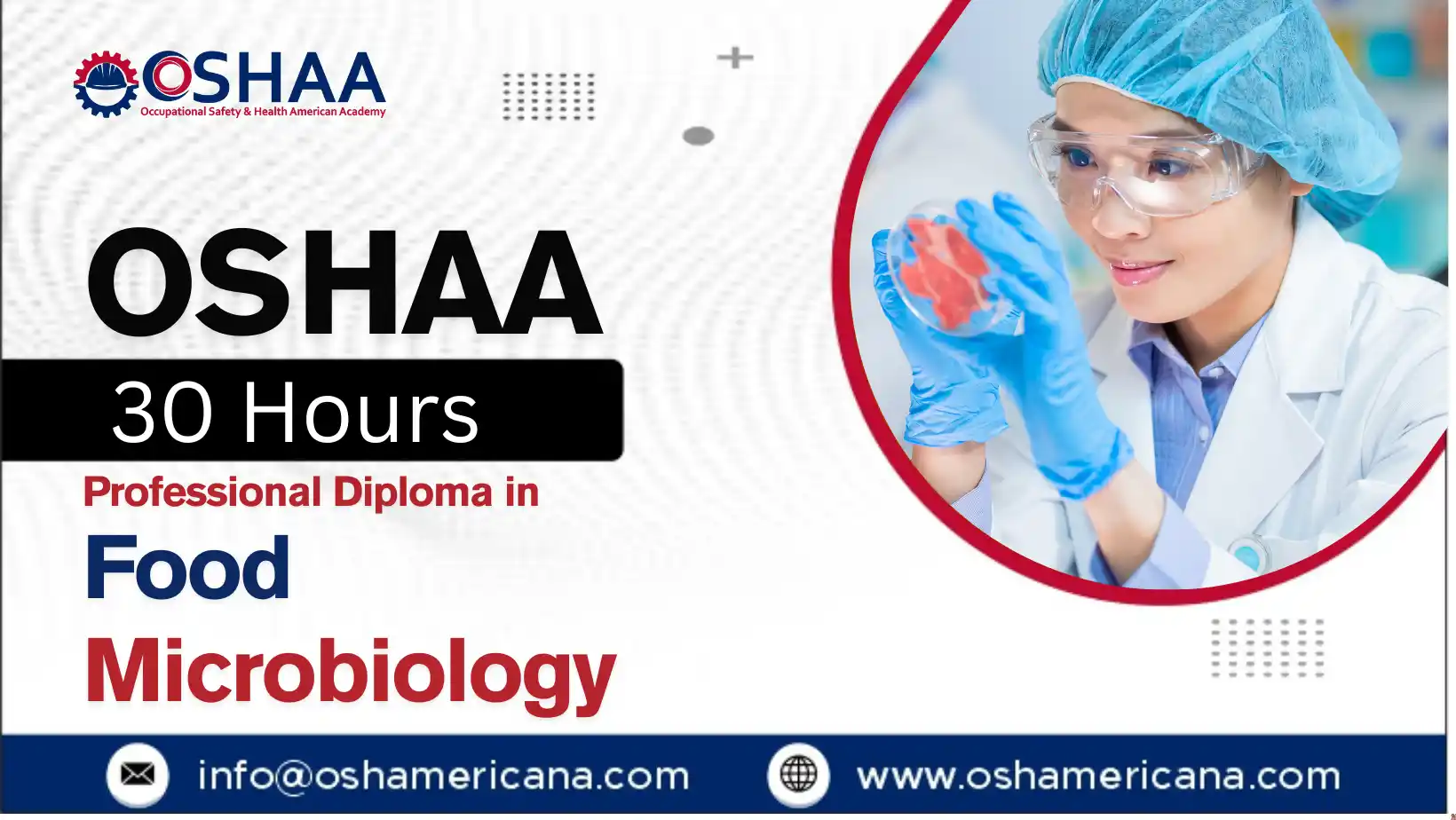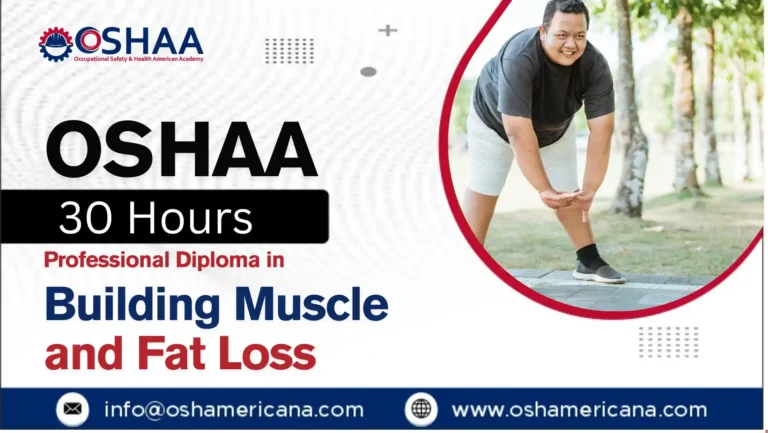Unlock the Secrets of Food Safety with Diploma
The OSHAA 30-Hours Professional Diploma in Food Microbiology is a specialised programme designed to equip participants with an in-depth understanding of microbiological principles as they apply to the food industry. Developed in accordance with the highest safety and hygiene standards, this diploma provides a robust foundation in identifying, managing, and controlling microbiological hazards across food production and handling environments.
Food microbiology plays a vital role in maintaining public health, ensuring product quality, and complying with international regulatory frameworks. Through this diploma, participants gain essential knowledge of microbial contamination, spoilage organisms, foodborne pathogens, and the critical control measures required to mitigate associated risks. The curriculum has been carefully structured to align with OSHA guidelines, ensuring that participants are well-versed in the occupational safety implications within food microbiology.
The OSHAA 30-Hours Professional Diploma in Food Microbiology is particularly valuable for those seeking to advance their careers in food production, quality assurance, regulatory compliance, or health and safety management. Whether participants are entering the industry or building on existing experience, the diploma provides both the scientific grounding and regulatory insight needed to navigate complex food safety challenges with confidence and competence.
Upon successful completion, participants will possess a recognised qualification that demonstrates their expertise in food microbiology and workplace safety. This not only enhances employability across a range of food-related sectors but also supports a culture of continuous improvement and safety within their organisations.
OSHAA 30-Hours Professional Diploma in Food Microbiology
Study Units
Learning Outcomes
This course is ideal for food industry professionals, safety officers, microbiologists, quality control personnel, and anyone passionate about food safety and public health. It provides essential skills for preventing contamination, ensuring compliance with OSHA standards, and enhancing expertise in food microbiology.
Introduction to Food Microbiology and OSHA Standards
- Gain a foundational understanding of food microbiology concepts and scope
- Recognise the critical role of microbiology in food safety and public health
- Identify key OSHA regulations relevant to food industry operations
- Learn the importance of occupational safety in microbiological risk prevention
- Develop awareness of industry standards and best practices
Classification and Characteristics of Microorganisms in Food
- Differentiate between bacteria, viruses, yeasts, and moulds affecting food
- Understand the structure, function, and taxonomy of microorganisms
- Identify beneficial versus harmful microorganisms in food products
- Learn proper nomenclature used in food microbiology
- Enhance skills to classify microorganisms for safety and quality control
Sources and Transmission of Foodborne Pathogens
- Identify common sources of pathogens in the food supply chain
- Understand modes of transmission through handling, processing, and storage
- Recognise high-risk practices and environments for contamination
- Learn strategies to prevent introduction and spread of pathogens
- Strengthen knowledge for risk assessment and food safety planning
Microbial Growth, Survival, and Control Factors
- Explore conditions that promote or inhibit microbial growth in food
- Understand intrinsic and extrinsic factors affecting microbial survival
- Identify key methods to control microorganisms in food systems
- Apply microbial ecology principles to maintain food safety
- Gain practical skills for contamination prevention in the workplace
Food Spoilage and Preservation Techniques
- Recognise signs and causes of microbial spoilage in food
- Understand the impact of spoilage on quality and safety
- Learn traditional and modern preservation methods
- Evaluate effectiveness of preservation techniques in inhibiting spoilage
- Develop knowledge to extend shelf life while ensuring safety
Foodborne Illnesses: Case Studies and Risk Analysis
- Analyse real-life outbreaks to identify causative organisms
- Understand symptoms and health impacts of foodborne diseases
- Evaluate risk factors contributing to contamination and illness
- Apply critical thinking to preventive and corrective measures
- Learn practical strategies to minimise public health risks
Sampling Methods and Microbiological Testing in Food
- Understand standard sampling techniques in food environments
- Identify tools and procedures for accurate sample collection
- Learn laboratory methods for detecting and identifying microorganisms
- Interpret microbiological test results to guide safety decisions
- Strengthen skills in quality control and compliance monitoring
HACCP Principles and Application in Food Safety Management
- Understand the seven principles of HACCP systems
- Identify critical control points in food processing and handling
- Develop hazard analysis and implement effective monitoring procedures
- Evaluate HACCP plans to maintain consistent food safety
- Apply knowledge to improve operational safety and regulatory compliance
This course equips learners with in-depth knowledge of food microbiology, pathogen control, and HACCP-based safety management. It is perfect for professionals seeking to enhance food safety practices, prevent contamination, and advance their careers in the dynamic food industry.
Course Benefits of the OSHA 30-Hours Professional Diploma in Food Microbiology
- Provides a comprehensive understanding of microbiological hazards in the food industry
- Equips participants with practical skills to identify, monitor, and control foodborne pathogens
- Enhances knowledge of food safety legislation and OSHA compliance requirements
- Strengthens the ability to implement and manage HACCP and GMP frameworks
- Improves workplace safety and reduces the risk of contamination and foodborne illnesses
- Boosts professional credibility with a recognised qualification in food microbiology
- Supports career advancement in food production, quality assurance, and safety management roles
- Enables participants to conduct effective microbiological sampling and laboratory testing
- Promotes critical thinking and analytical skills through real-world case studies
- Aligns training with international food safety standards and industry best practices
The OSHA 30-Hours Professional Diploma in Food Microbiology is ideal for individuals seeking to build or enhance their expertise in food safety and microbiology within regulated environments. This course is particularly suited for:
- Participants working in food manufacturing, processing, or packaging
- Quality assurance and quality control professionals in the food industry
- Food safety officers and hygiene supervisors
- Health and safety practitioners in food-related sectors
- Laboratory technicians involved in food microbiological testing
- Regulatory compliance professionals responsible for food standards
- Participants aspiring to enter the food safety or microbiology field with a formal qualification
- Individuals involved in implementing or managing HACCP and GMP systems
- Professionals looking to align their workplace practices with OSHA and international food safety requirements







